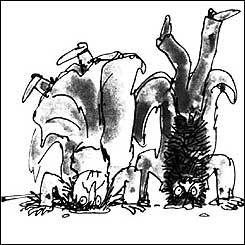Your recent article 'shrinking through the ages' (www.cbc.ca/news/background/health/aging.html) erroneously portrays the loss of bone mass in elderly people as an inevitability of the human condition. In fact, reduction in bone mass can be primarily attributed to our modern diet, and is easily avoided, given sufficient knowledge. There are four related features of a typical modern diet which together contribute to loss of bone mass:
Low dietary mineral content:
Foods traditionally valued for outstanding mineral content, such as organ meats and bone broths, are rarely consumed by the average modern Canadian. Fresh milk from healthy grass-fed cows, once the primary daily source of minerals, has been replaced by milk from cows fed a grain-based diet, and bred to produce high quantity but not high quality milk, from which the already poor mineral content is further depleted through intensive processing. Mineral-rich butter from grass-fed cows has largely been replaced by processed vegetable oils. Sea salt, with a large and balanced spectrum of trace elements, has given way to refined sodium chloride. The vegetables which once provided a significant contribution to our mineral intake are now likely to be grown in soils depleted of nutrients, thanks to industrial scale monocropping agricultural practices.
Low intake of nutrients which promote mineral absorption:
Even if sufficient minerals are present in our diets, our bodies cannot absorb and utilize them correctly without the necessary cofactors: the fat soluble vitamins A and D, and cholesterol. Changes in our eating habits, fuelled to a large degree by an aggressive yet unfounded anti-cholesterol and anti-saturated fat campaign, have led to a drastic reduction in consumption of these necessary cofactors. Without eating high quality fresh whole milk dairy products and unprocessed animal fats, we are undoubtedly not absorbing a significant fraction of the minerals already present in our diets.
High intake of factors which inhibit mineral absorption:
The increasing consumption of carbohydrates in modern diets, without the traditional methods of preparation, has greatly increased our intake of 'anti-nutrients'. Soybeans and many grains contain phytic acid, which unless neutralized by fermenting, sprouting or soaking, will actively prevent absorption of minerals. Unfortunately, infants whose mothers can't or won't breast feed are instead given soy-based formula containing phytic acid, and so begin life with poor mineral supplies. The oxalic acid present in some leafy greens (which can be neutralized by cooking) and the tannins in black tea, have a similar effect on blocking mineral absorption.
High intake of foods that actively deplete mineral stores:
Metabolic acidosis is increasingly being recognized as a widespread result of poor modern diets, and as an underlying factor in many modern diseases, including osteoporosis. The pH balance of the body is shifted due to excessive intake of acidifying foods (such as refined carbohydrates and processed foods) and a deficit of alkalizing foods (those rich in minerals and antioxidants). In order to maintain the physiological blood pH of 7.4 (slightly alkaline), our bodies use as a buffer the mineral stocks in our bones. If those reserves are not continually replenished, metabolic acidosis occurs, with consequent loss of bone mass over time. The two worst offenders in the modern diet for contributing to metabolic acidosis are coffee and soft drinks, followed by most, if not all, processed and fast foods. To balance a diet that includes regular consumption of any of these culprits, an extremely high intake of minerals is required, otherwise the minerals in our bones are used as a buffer to prevent immediate damage to our bodies, resulting, of course, in the widespread phenomenon of shrinking through the ages.
Only by learning once again how to sustain ourselves on a diet of natural, carefully prepared, nutrient-dense foods, will we be able to maintaint our default healthy state throughout life, and 'the dreaded shrinks' can return to being merely a figment of Roald Dahl's imagination!

Further reading:
Weston A Price Foundation
Better Bones
The International Network of Cholesterol Sceptics
